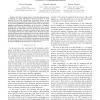Free Online Productivity Tools
i2Speak
i2Symbol
i2OCR
iTex2Img
iWeb2Print
iWeb2Shot
i2Type
iPdf2Split
iPdf2Merge
i2Bopomofo
i2Arabic
i2Style
i2Image
i2PDF
iLatex2Rtf
Sci2ools
ICC
2007
IEEE
2007
IEEE
Channel Estimation Considerations for Iterative Decoding in Wireless Communications
—The time-varying nature of wireless channels poses a challenge for using soft-decision iterative decoders on such channels. Even if the channel gain is perfectly known to the receiver, inaccurate estimation of the additive noise power, results in incorrect log-likelihood computation at the receiver and hence significant performance degradation in the decoder. Through a detailed study of the effects of channel estimation errors on the performance of soft-decision iterative decoders in uncorrelated block-fading channels, we propose a solution which does not need a knowledge of the power of the additive noise. We show that this solution performs almost identical to the case for which a perfect knowledge of the power of the additive noise exists at the receiver. The choice of the block-fading channel reflects a situation where the equivalent variance of the additive Gaussian noise can change in a wide range and thus the decoder performance seriously relies on the knowledge of the nois...
Additive Noise | Additive Noise Power | Communications | ICC 2007 | Soft-decision Iterative Decoders |
Related Content
| Added | 02 Jun 2010 |
| Updated | 02 Jun 2010 |
| Type | Conference |
| Year | 2007 |
| Where | ICC |
| Authors | Pirouz Zarrinkhat, Masoud Ardakani, Raman Yazdani |
Comments (0)

